Binomial nomenclature - Study guides, Class notes & Summaries
Looking for the best study guides, study notes and summaries about Binomial nomenclature? On this page you'll find 572 study documents about Binomial nomenclature.
Page 2 out of 572 results
Sort by
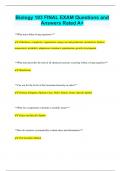
-
Biology 103 FINAL EXAM Questions and Answers Rated A+
- Exam (elaborations) • 29 pages • 2024
-
- $9.99
- + learn more
Biology 103 FINAL EXAM Questions and Answers Rated A+ **What traits define living organisms?** Orderliness, complexity, organization; energy use and production, metabolism; balance, homeostasis; irritability, adaptation (evolution); reproduction, growth, development **What term describes the total of all chemical reactions occurring within a living organism?** Metabolism **Can you list the levels of the taxonomic hierarchy in order?** Domain, Kingdom, Phylum, Class, Order, Family, Gen...
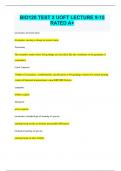
-
BIO120 TEST 2 UOFT LECTURE 9-15 RATED A+
- Exam (elaborations) • 25 pages • 2024
-
- $10.49
- + learn more
taxonomic diversification divergence causing a change in species name Taxonomy The scientific study of how living things are classified; like the vocabulary to the grammar of systematics Carol Linnaeus "Father of Taxonomy"; established his classification of living things; famous for animal naming system of binomial nomenclature; came BEFORE Darwin sympatric within a region Allopatric across regions taxonomic (morphological) naming of species naming based mostly on distinct measura...

-
Biology 103 FINAL EXAM QUESTIONS & ANSWERS VERIFIED 100% CORRECT
- Exam (elaborations) • 16 pages • 2024
- Available in package deal
-
- $7.99
- + learn more
What are the key characteristics of living things? - Answer-(1) Orderliness, complexity, organization (2) energy use and production, metabolism (3) balance, homeostasis (4) irritability, adaptation (evolution) (5) reproduction, growth, development The sum of all the chemical reactions that take place in the body is called _____. - Answer-metabolism Taxonomic Heirarchy (IN ORDER!) - Answer-Domain, Kingdom, Phylum, Class, Order, Family, Genus, Specific Epithet What two parts make up a scie...

-
BIOL 1408 Questions and Answers
- Exam (elaborations) • 25 pages • 2024
-
- $12.49
- + learn more
Taxonomy Ans- the scientific discipline concerned with naming organisms Phylogeny Ans- is the evolutionary history of a species or group of related species. Systematics Ans- the scientific discipline focused on classifying organisms based on phylogeny. Carolus Linnaeus Ans- -Swedish "father of taxonomy" -Published *Systema Naturae -assigned organisms a two part name called binomial -contained names and classification of most known plants and animals of the early 1700's Binomial...

-
Biology 103 FINAL EXAM Questions with Complete Correct Answers | Grade A+
- Exam (elaborations) • 33 pages • 2024
-
- $14.19
- + learn more
What are the key characteristics of living things? Ans: (1) Orderliness, complexity, organization (2) energy use and production, metabolism (3) balance, homeostasis (4) irritability, adaptation (evolution) (5) reproduction, growth, development The sum of all the chemical reactions that take place in the body is called _____. Ans: metabolism Taxonomic Heirarchy (IN ORDER!) Ans: Domain, Kingdom, Phylum, Class, Order, Family, Genus, Specific Epithet What two parts make up a scientific nam...

-
MICROBIOLOGY EXAM 1, CH.1-3 & 7, UTA, DR. THOLEN QUESTIONS AND ANSWERS ALREADY PASSED
- Exam (elaborations) • 41 pages • 2024
- Available in package deal
-
- $11.49
- + learn more
MICROBIOLOGY EXAM 1, CH.1-3 & 7, UTA, DR. THOLEN QUESTIONS AND ANSWERS ALREADY PASSED Which of the following foods is NOT made by fermentation? A) Beer B) Bread C) Cheese D) Orange D Who is considered the ''Father of Western medicine''? Hippocrates Who was the first to observe ''animalcules'' under the microscope? Leeuwenhoek Who proposed that swamps might harbor tiny, disease-causing animals too small to see? Varro Which of the following was NOT a kingdom in Linnaeus...
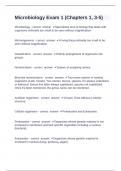
-
Microbiology Exam 1 Question and answers verified to pass
- Exam (elaborations) • 35 pages • 2024
-
Available in package deal
-
- $13.49
- + learn more
Microbiology Exam 1 Question and answers verified to pass Microbiology - correct answer Specialized area of biology that deals with organisms ordinarily too small to be seen without magnification. Microorganisms - correct answer A living thing ordinarily too small to be seen without magnification. Classification - correct answer Orderly arrangement of organisms into groups. Nomenclature - correct answer System of assigning names. Binomial nomenclature - correct answer Two...
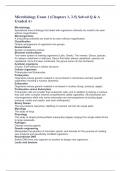
-
Microbiology Exam 1 (Chapters 1, 3-5) Solved Q & A Graded A+
- Exam (elaborations) • 18 pages • 2023
-
Available in package deal
-
- $14.29
- + learn more
Microbiology Exam 1 (Chapters 1, 3-5) Solved Q & A Graded A+ Microbiology Specialized area of biology that deals with organisms ordinarily too small to be seen without magnification. Microorganisms A living thing ordinarily too small to be seen without magnification. Classification Orderly arrangement of organisms into groups. Nomenclature System of assigning names. Binomial nomenclature Two-name system of naming organisms (Latin, Greek). Two names: Genus, species. It's always underl...

-
MICRO EXAM 1-Tholen 2460 Questions and Correct Answers | Latest Update
- Exam (elaborations) • 30 pages • 2024
- Available in package deal
-
- $13.49
- + learn more
Microbiology The study of microorganisms Ubiquitous Present or existing everywhere Opportunistic If given the right conditions, they can cause harm Antonie van Leeuwenhoek () -Dutch linen merchant. -First to observe living microbes. -Single-lens magnified up to 300X. Louis Pasteur -First to show strains were unique -Performed fermentation Master01 | October, 2024/2025 | Latest update 1 | P a g e | © copyright 2024/2025 | Grade A+ -Developed pasteurization and vaccines Rober...
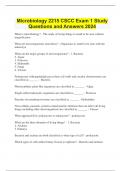
-
Microbiology 2215 CSCC Exam 1 Study Questions and Answers 2024
- Exam (elaborations) • 8 pages • 2024
-
- $11.99
- + learn more
What is microbiology? - The study of living things to small to be seen without magnification What are microorganisms (microbes)? - Organisms to small to be seen with the naked eye What are the major groups of microorganisms? - 1. Bacteria 2. Algae 3. Protozoa 4. Helminths 5. Fungi 6. Viruses Prokaryotes with peptidoglycan in their cell walls and circular chromosomes are classified as ______. - Bacteria Photosynthetic plant-like organisms are classified as ______. - Algae Sing...

How much did you already spend on Stuvia? Imagine there are plenty more of you out there paying for study notes, but this time YOU are the seller. Ka-ching! Discover all about earning on Stuvia


